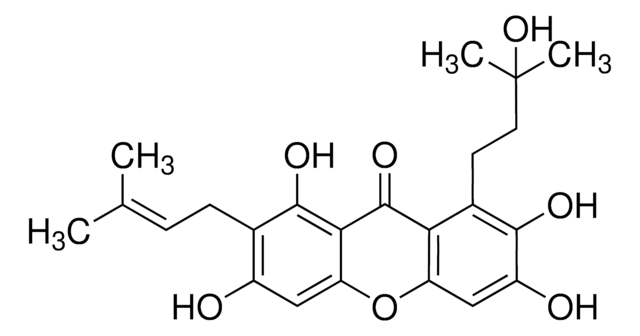382110
Histone Acetyltransferase Inhibitor II
The Histone Acetyltransferase Inhibitor II, also referenced under CAS 932749-62-7, controls the biological activity of Histone Acetyltransferase. This small molecule/inhibitor is primarily used for Cell Structure applications.
Synonym(s):
Histone Acetyltransferase Inhibitor II, 2,6- bis-(3-Bromo-4-hydroxybenzylidene)cyclohexanone, HAT Inhibitor II, p300/CBP Inhibitor II, GCN5 Inhibitor I, 2,6-bis-(3-Bromo-4-hydroxybenzylidene)cyclohexanone, HAT Inhibitor II, p300/CBP Inhibitor II, GCN5 Inhibitor I
About This Item
Recommended Products
Quality Level
Assay
≥97% (HPLC)
form
solid
manufacturer/tradename
Calbiochem®
storage condition
OK to freeze
protect from light
color
yellow
solubility
ethanol: 10 mg/mL
DMSO: 25 mg/mL
shipped in
ambient
storage temp.
2-8°C
InChI
1S/C20H16Br2O3/c21-16-10-12(4-6-18(16)23)8-14-2-1-3-15(20(14)25)9-13-5-7-19(24)17(22)11-13/h4-11,23-24H,1-3H2/b14-8+,15-9+
InChI key
YOLKEKNTCBWPSD-VOMDNODZSA-N
General description
Packaging
Warning
Reconstitution
Other Notes
Legal Information
Storage Class Code
11 - Combustible Solids
WGK
WGK 1
Flash Point(F)
Not applicable
Flash Point(C)
Not applicable
Certificates of Analysis (COA)
Search for Certificates of Analysis (COA) by entering the products Lot/Batch Number. Lot and Batch Numbers can be found on a product’s label following the words ‘Lot’ or ‘Batch’.
Already Own This Product?
Find documentation for the products that you have recently purchased in the Document Library.
Our team of scientists has experience in all areas of research including Life Science, Material Science, Chemical Synthesis, Chromatography, Analytical and many others.
Contact Technical Service








